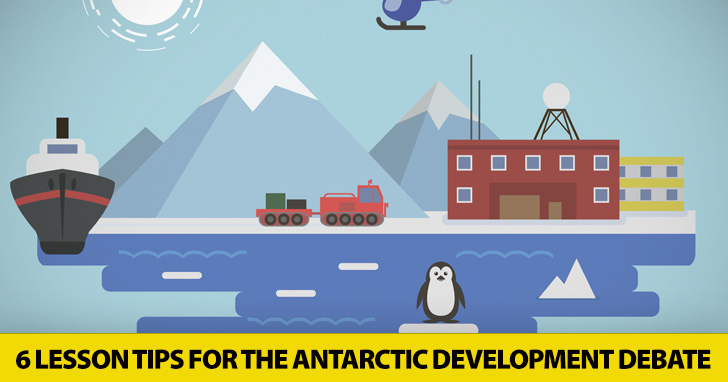
Are your students as environmentally aware as mine?
Media attention and formal education has ensured that the groups I work with are, at the very least, fairly well aware of the world’s key environmental issues. By the time they move into upper-intermediate level classes, and often before, they have the requisite vocabulary to discuss climate change, global warming and pollution in some detail. One day, I decided I’d expand on these foundations and create a dynamic, discursive game based around the themes of development, but in an area which receives less press coverage than many others: Antarctica.
The aims are to encourage plenty of speaking and debating, to clarify perceptions of Antarctica’s status and its importance as an ecosystem, and to practice high-level question forms. There’s also a section on chemistry for the scientifically minded. Here’s how to organize and run a successful debate based on this important topic.

6 Lesson Tips for the Antarctic Development Debate
-
1
Ask Check Questions on the Basics
Begin by putting your students in mind of this remote and remarkable region. Find out what they already know, and add detail to ensure everyone’s on the same page. These are some good questions to elicit the relevant information:
- Can you name the seven continents of the world?
- Which of these has the smallest population / is the coldest / is the most difficult to travel to?
- How could you reach Antarctica as a tourist?
- Who owns Antarctica?
- Does anyone live there in the winter? Is that even possible?
- What kind of animals live there?
- What’s been happening to Antarctica’s climate in recent years?
Here is a useful two-page document of background material, which you should hand out to your students at this point.
-
2
Read the Background Together
I’m a big fan of reading aloud, even for more experienced students; it lets you hear pronunciation and word stress, and you can always stop to discuss a point, ask for more information, check the meaning of a word, etc.
Make sure your students are able to summarize the viewpoints of the Antarctic Development Group (ADG) and the Antarctic Protection League (APL). One way of framing this is through contrasts: “The ADG believes that Antarctica can tolerate development, whereas the APL believes development will have an irreversible impact on the region.”
Both organizations, as you’ll notice from the futuristic date in the first paragraph, are fictitious, though this hasn’t stopped some of my enterprising students from Googling them!
-
3
(Optional) A Little Chemistry
Happily, most of your students (especially if you teach foreign visitors in the US or UK, for instance) will have gone through high school science courses, and will be familiar with the Period Table of Elements. If they show interest, go ahead and have them quickly research the English nouns for the elements listed on the map in the handout. Some will be surprised at the range of metals available. It’s also notable that many of the known deposits are near the coast, which would make the difficult job of extraction somewhat easier.
-
4
Divide into Two Groups
In whichever way you prefer organize the students into the APL and the ADG. Have them quickly review their policies on Antarctica, and read the section ‘The Task’ on the handout.
Before beginning the debate, be sure that everyone understands your format. Reiterate your rules, including the importance of listening carefully, taking notes, giving others time to finish their point, and using respectful language. Equally important is the division of the speaking responsibilities between each member of the group; organizing the material in this way ensures against the more confident students dominating proceedings. You may also need to encourage the quieter students a little, while courteously asking the more eager contributors to wait their turn.
-
5
Hold The Debate
There are many points to consider, including:
- Is a belief in trickle-down economics reasonable, when it comes to Antarctica?
- Will it be possible to mitigate or entirely repair the damage which development will inevitably cause? How can the human ‘footprint’ be reduced, perhaps until it’s as close as possible to zero?
- What effects will the development have on the wildlife? Can special ‘reserves’ be set up, along the lines of national parks, where no exploitation is permitted?
- Is there truly a justification for drilling and mining in a pristine wilderness? Can the socio-economic benefits be said to outweigh the risks and potential damage?
-
6
Extending the Exercise
Once the debate is concluded, consider extending this material to produce a fully-fledged, integrated-skills exercise. Here are some possibilities:
Speaking:
- After the debate, ask each team to propose sustainable solutions to address the overall problem. Give them time to negotiate (perhaps as two large groups, or in pairs of representatives from each group) in order to find a compromise which protects the ecosystem while still yielding some sustainable benefits for humankind.
Listening:
- Either in class, or independently, invite your students to watch one of the terrific Antarctic documentaries which have emerged in recent years. A Year On Ice and Werner Herzog’s marvelous Encounters at the End of the World are well worth your time. David Attenborough’s BBC series Life In The Freezer is tremendously successful television, as is the documentary classic March of the Penguins. Subtitles can be optional; for upper-intermediate or advanced students, consider doing without them, but asking very regular check questions to make sure everyone’s still on the ball.
Reading:
- Assign research tasks on any of the issues raised by Antarctic development: the Antarctic treaty, the founding of McMurdo station, the heart-wrenching Scott expedition to the South Pole and Amundsen’s successful journey, the Shackleton expedition (about which there are also memorable documentaries), etc.
Writing:
- Op-Ed pieces on how development should be addressed when it comes to this sensitive and unique region
- A piece in support of, or against, the notion of trickle-down economics
- The diary of a McMurdo worker or (to bring in some imagination and empathy) the diary of a migrating penguin.
To give yourself a little background, consider taking a few moments to do some reading before approaching this material with your students.
Having a few facts to hand, and being able to show a basic understanding of the relevant laws and policies, will always impress your students and give you some welcome confidence. The above links will help. Consider also this thoughtful BBC piece on tourism in Antarctica.
P.S. If you enjoyed this article, please help spread it by clicking one of those sharing buttons below. And if you are interested in more, you should follow our Facebook page where we share more about creative, non-boring ways to teach English.







